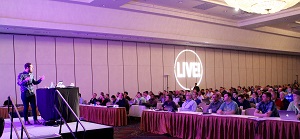News
.NET Continues Its Broad Reach
Already a powerful and popular framework, the .NET family continues to gather steam.
In recent years, the .NET framework has expanded to nearly every platform and device, with .NET Core and ASP.NET Core even going open source. So when James Montemagno says .NET everywhere and for everyone (which was the title of his keynote presentation), he truly means that statement. Montemagno is the principal program manager for mobile developer tools at Microsoft, and an enthusiastic proponent of cross-platform development. He kicked off Visual Studio Live! in Las Vegas with his keynote address on Tuesday morning.
"Right now is best time to be a developer," says Montemagno. "The tools are evolving and the languages are evolving ... and it is absolutely the best time to be a .NET developer. It enables us to develop code on any OS we want, it has great tools for Visual Studio, it works with amazing languages, and there's a beautiful community of developers creating awesome libraries."
 [Click on image for larger view.] Microsoft's James Montemagno at the Visual Studio Live! Keynote in Las Vegas
[Click on image for larger view.] Microsoft's James Montemagno at the Visual Studio Live! Keynote in Las Vegas
Montemagno framed his presentation stating he wanted to highlight three important things:
- The first is how productive you can be as a .NET developer no matter the language or OS in which you're developing.
- Next is you can build apps on all sorts of platforms and can share code. He also shared some of the latest code sharing strategies.
- And that every single app is high performing, operating smoothly at a high level.
"So let's jump into the world of .NET," he says. ".NET should be absolutely everywhere: on the cloud, on mobile devices, servers, and desktops. And your .NET C# code is going to run absolutely great absolutely everywhere."
Whether Windows apps, cross platform services, or mobile apps, as a .NET developer, you can work on all of them, says Montemagno. "And it continues to evolve."
There continue to be numerous contributions to the .NET Foundation from developers all over the world and even corporations like Samsung. "It's helping grow the .NET ecosystem," he says. There have been nearly 7.2 billion .NET package downloads from NuGet.
"While open source is great, we want new developers to jump and learn about .NET. We want to get kids and students interested in .NET," says Montmagno. "But they don't want to spend two or three hours learning it. They want to learn right inside the browser."
Then he moved into demo of the Learn link on the .NET site, an in-browser tutorial. "Imagine a student getting started," he says. "They can go ahead and run this and it's compiled in the cloud and output right here." Students and developers can then compile code, modify code, debug, and run it again.
"It's more than just compiling my code," he says. "It can help you learn advanced APIs and learn about C# and F#. Now you're essentially doing C# .NET development in your browser. It's crazy powerful."
Montemagno turned his focus to .NET Core and ASP/NET Core. ".NET core is the cross platform .net runtime optimized for Windows, Mac, and Linux. You can create apps and services and Web sites that can run on any of those platforms," he says.
When it comes to web development, he says, "ASP.NET is the de facto standard. Traditionally, ASP.NET had to run on Windows. That's where ASP.NET Core leverages all that goodness of .NET core that can run cross platform. Also ASP.NET Core is about 20 percent faster than mainstream frameworks."
Then he discussed productivity as a developer with .NET, giving a demo of creating a new app, highlighting the Visual Studio family using .NET and the command line. "Within 30 seconds, I now have ASP.NET Core app running on my local machine. And I am actually debugging that app from the command line."
He worked through creating, starting and debugging an app with Visual Studio, .NET and CLI. "That's the power as you progress from command line to debug to full IDE."
He moved on to end-to-end development when it comes to mobile app. "Visual Studio App Center builds on VS Team Services for any app built in any language. It offers services like analytics and crash reporting." He continued to demo the various functions he was discussing as he spoke, including a demo of distributing Docker container images, pushing an app up to Azure, and code sharing.
He concluded by talking about the relatively new .NET Embedder. "When I say .NET everywhere, I mean .NET everywhere. But what if you didn't have to rewrite an app? You didn't have to start from scratch?" he says. "That's what the .NET Embedder does. It can turn any .NET library into a native library for any language."
The next Visual Studio Live! events are Visual Studio Live! Austin from April 30-May 4 and Visual Studio Live! Boston from June 10-14.
About the Author
Lafe Low is the editorial liaison for ECG Events.